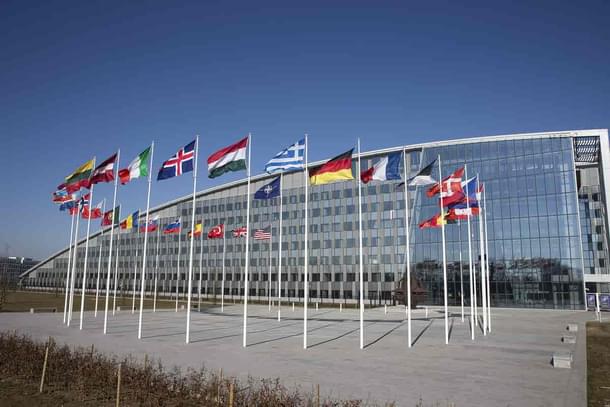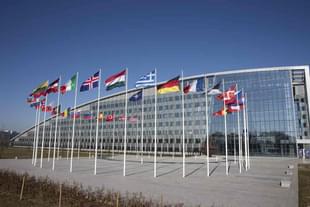World
How Europe Became A 2nd-Rate Power By Outsourcing Its Strategic Thinking To Uncle Sam In NATO
R Jagannathan
Mar 10, 2025, 12:34 PM | Updated Apr 02, 2025, 02:44 PM IST
Save & read from anywhere!
Bookmark stories for easy access on any device or the Swarajya app.


This is the way the world ends
Not with a bang but a whimper.
- TS Eliot
It would be quite ironic if the war to prevent NATO from expanding to Ukraine were to ultimately result in the disbandment or debasement of the world’s most successful security alliance — the North Atlantic Treaty Organization (NATO).
The Warsaw Pact ended when the Soviet Union collapsed; NATO will shrivel when its prime mover — the US — decides that it has other uses for its money. As in TS Eliot's poem above, the end of NATO may come not with a dramatic bang, but a whimper.
Donald Trump’s America has already indicated that it wants a new relationship with Russia, and if that means some of Ukraine’s (and Europe's) interests will be sold down the river, so be it.
After Ukraine President Volodymyr Zelenskyy’s public spat with Trump in the White House, the US has suspended military aid to Ukraine and stopped intelligence sharing. The war is now going against Ukraine, with Russia gaining an advantage.
While Europe hopes to fill the military gap left behind by the US, it will be a long while before it can truly replace America as Ukraine’s paymaster and defender. The European Union (EU) has proposed a defence spending plan of $860 billion (Euro 800 billion), but this will take a while to take shape, and most of the equipment will anyway have to come from the US for now.
Germany’s likely next Chancellor, Friedrich Merz, is talking of freedom from American influence, and Poland’s Prime Minister Donald Tusk is talking of raising his army’s size to 5,00,000 and seeking nuclear arms to defend itself against Russia. These straws in the wind indicate that Europe does not see America defending it when it comes to the crunch.
While it is unlikely that NATO will actually be disbanded, the Trump administration is already talking of an altered NATO where its security guarantees will favour countries that spend more on defence. To withdraw from NATO, Trump needs to get Congress to agree, but there are ways to sidestep the legal requirements for a formal withdrawal using presidential prerogatives.
Whatever happens, it seems as if the best days of a unipolar NATO, where America provided both the security guarantee and policy ballast, are coming to a close. NATO cannot go back to business as usual after Trump has made his intentions about making up with Russia clear.
Europe’s predicament is the direct result of its decision to outsource all strategic thinking to Uncle Sam while benefiting from its nuclear umbrella.
After the Second World War ended, it made sense for Europe to kowtow to the US, but it assumed that the US would never think of its own interests first at some point in time. No big power ever does that. The US was all for NATO as long as it served the interests of its military-industrial complex and global priorities. Once that changed, the US dropped Europe like a hot potato, leaving it to fend for itself.
The wakeup call should have come at the start of the Ukraine war when the US virtually forced Germany to end its dependence on cheap Russian natural gas and the Nord Stream pipeline was blown up, but even then Europe could not think beyond its 'Russophobia,' which automatically made it pro-Ukraine to a fault.
The main mistakes Europe made are the following:
First, it failed to notice that the US’s economic and geostrategic interests in Europe — a low-growth economy — were not as important as the looming Chinese threat in the Asia-Pacific and harnessing Asia’s growing economic power. The US had to shift focus to Asia, even if it did not plan to involve itself in local wars there.
Second, Europe has made the grievous error of ignoring Russia’s red lines on security. When Vladimir Putin and Russia have repeatedly been talking about keeping NATO away from Russia’s borders, Europe went in the other direction, pushed by the smaller countries situated next to Russia.
Third, whether Europe likes it or not, Russia is a European power, and nearly 80 per cent of Russia’s population is west of the Urals, in European Russia. A European power cannot be treated as a leper by Europe, even assuming it is not a democracy. If an army-run (and, now, an Islamist-run) Turkey could remain a part of NATO, why can't Russia be an economic partner of Europe?
Europe’s best interests lie in harnessing Russia’s cheap energy and trade prospects even while the latter remains outside the EU. Europe’s global competitiveness depends on a partnership with Russia, and it is unlikely that Russia will endanger good economic ties with Europe by mindless expansionism to its west. Russia also does not want to put all its eggs in the Chinese basket. A European partnership provides a useful counterweight to China.
Fourth, NATO has constrained Europe’s natural strategic thinking by restricting its options. For example, creating its own defence industry needs partnerships with countries like India, Japan, Brazil and Indonesia, among others. By allowing the US to exercise a veto on its defence choices, Europe has shot itself in the foot. Now its return to strategic autonomy will be slow and painful.
While freeing itself from NATO will enable Europe to define its own economic interests better, the main lesson to learn is that no great power — and Europe can be one collectively — can outsource strategic thinking to one dominant ally. It's time to grow up.
Jagannathan is former Editorial Director, Swarajya. He tweets at @TheJaggi.





